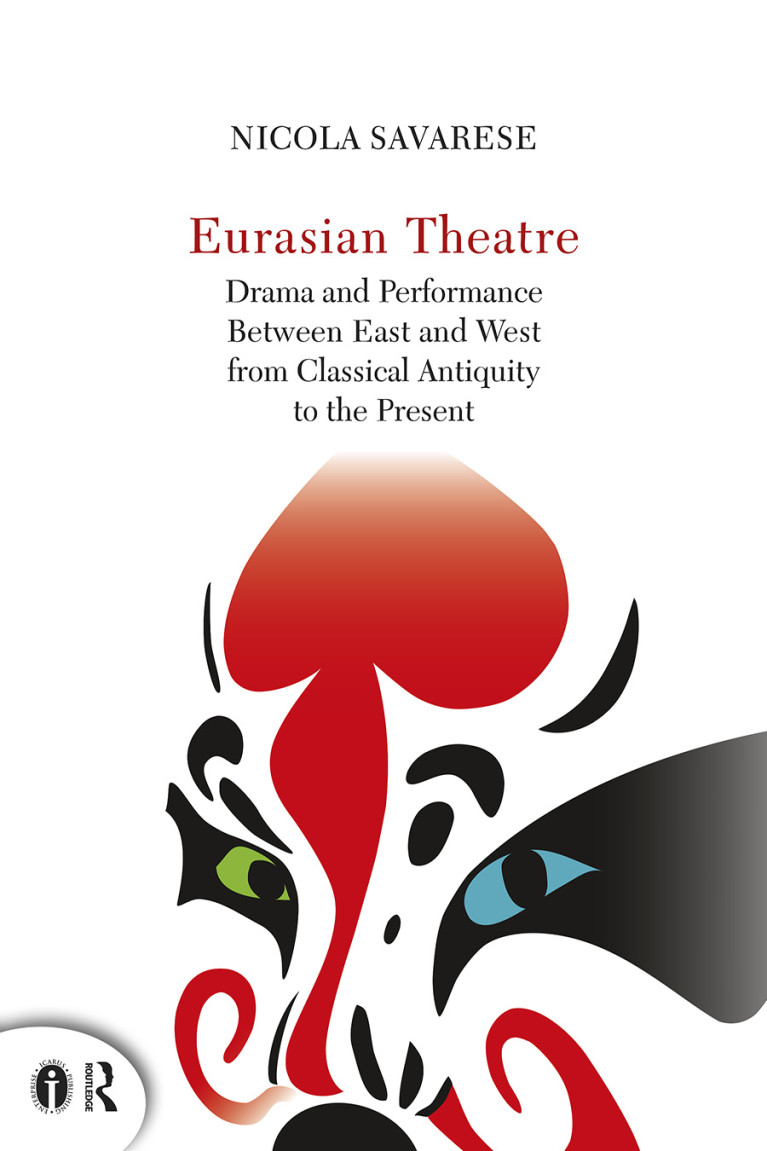- Autor: Nicola Savarese
- Przekład: Richard Fowler
- Wydawnictwo: Routledge, Icarus Publishing Enterprise
- Data wydania: 2013
- ISBN: 978-0-415-72297-1
- Format: 170×240
- Liczba stron: 640
- Rodzaj oprawy: twarda
Eurasian Theatre: Drama and Performance Between East and West from Classical Antiquity to the Present
Nicola SavaresePlease note that we ship only to addresses within Poland. If you want to order a book and have it shipped to an international address, email us at ksiegarnia@grotowski-institute.pl.
Translated from the Italian by Richard Fowler
Updated version revised and edited by Vicki Ann Cremona
The distances that separate East from West – the two extremes of the Eurasian continent – are enormous. Yet, since ancient times, the people of Europe and Asia have tried to overcome this remoteness through a network of trade routes known as the Silk Road. The great migrations, the continuous military conquests and the paths relentlessly opened up by merchants have been at the origin of ideological, technical and artistic exchanges, resulting in a fusion of cultures.
Among the ceaseless travellers on the routes of the Silk Road, along with soldiers, merchants, messengers, and pilgrims, we find those who earned their living as jugglers, acrobats, musicians, actors and dancers. They were people who brought with them, rooted in their bodies, their own techniques and histories. Through these performers, the ‘fabulous and mysterious Orient’ has exerted an ongoing influence on the art of the theatre in Europe and America. In the same way, especially in modern times, actors and dancers from India, China, Japan, and other Asian countries have drawn inspiration from Western dramatic genres for a renewal of their ancient traditions.
A long history of travelling actors moving between East and West has slowly taken shape, and lies at the foundation of our contemporary, professional performative arts. This updated and revised edition of Drama and Performance Between East and West (first published in 1992), traces this history from classical antiquity to the present. The book constitutes the first complete in-depth historiographic inquiry into the subject.
Nicola Savarese (born in Rome, in 1945) is a member of the scientific staff of ISTA, the International School of Theatre Anthropology founded in 1980 by Eugenio Barba. He was professor of Performing Arts at the Universities of La Sapienza (Rome), Lecce, Bologna, and Roma Tre. He has also lectured at the Universities of Kyoto, Montreal, and Sorbonne III. He has travelled widely in Asia and particularly in Japan, where he lived for two years. His research and publications focus mainly on the complex dynamics of the encounters between Asian and Western theatres. His books include, among others: Il teatro al di la’ del mare (The Theatre beyond the sea, 1980), Parigi/Artaud/Bali (1997) and, in collaboration with Eugenio Barba, A Dictionary of Theatre Anthropology. The Secret Art of the Performer (1997) that has been translated into many languages. His research on classical Roman theatre, and in particular on the body-techniques of ancient pantomimes, gave rise to an exhibition inside the Colosseum in Rome (In Scaena Catalogue, 2007). He is also editor of the journals Teatro e Storia and Dyonisus ex machina. (www.nicolasavarese.it)
Considering that 50% of all books in translation worldwide are translated from English, whilst only 6% are translated into English, Odin Teatret (Denmark), the Grotowski Institute (Poland) and Theatre Arts Researching the Foundations (Malta) have created Icarus Publishing Enterprise, whose purpose is to present texts by artists and scholars in English translation about the practice and vision of theatre as a laboratory.
Icarus was the name of a schooner that sailed from Civitavecchia in 1697 with a cargo destined for a Venetian merchant resident in the international trading port of Smyrna. Its mythological name was intended, paradoxically, as a bringer of good luck, to ward off shipwrecks. In its hold, the small vessel also carried a luxurious curtain never used before, a few painted scenes and a number of scripts and musical scores from a theatre erected in Rome by Queen Cristina of Sweden and torn down on the order of Pope Clement X.
Similarly to that schooner, Icarus Publishing Enterprise wants to ferry into international waters writings of theatre artists and scholars who, despite their value, risk a limited circulation because of the language in which they have been written. We know by experience that theatre studies are effective only if they succeed in piercing the wrappings of academic commonplaces and inspire those wishing to do theatre. Many think that the theatre has no future. This may be so. But one thing is certain: in the future there will surely be something that we are unable to imagine now, but that will be called theatre.




